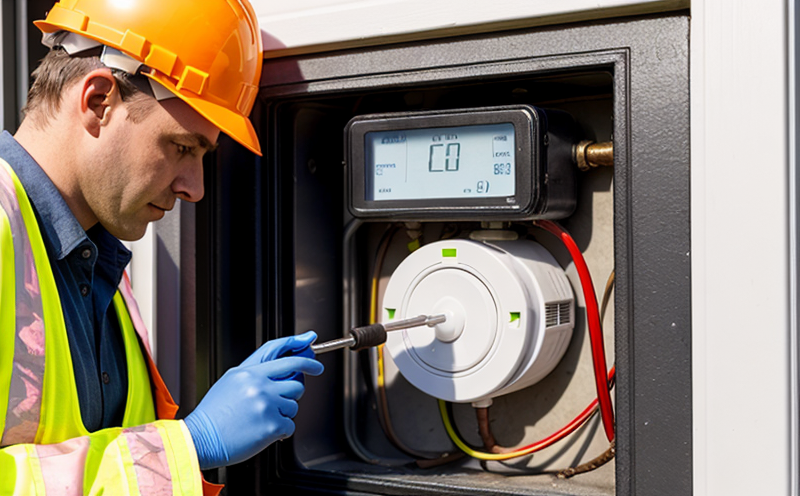Smart meter inspection
Smart meters are a critical component in today's energy systems. They not only measure electricity consumption but also provide real-time data that is essential for optimizing power distribution, reducing waste, and ensuring consumer compliance with utility regulations. As the demand for smarter energy management solutions grows, so does the need to ensure these meters function accurately and reliably.
Smart meter inspection services are designed to verify the performance and integrity of smart meters as per international standards such as ISO 9763-1:2015 and IEC 62056. This process ensures that utilities can trust the data provided by these meters, which is crucial for billing accuracy, energy efficiency programs, and overall grid reliability.
The inspection involves a series of tests to evaluate various aspects of smart meter functionality including accuracy, stability, communication protocols, tamper resistance, and cybersecurity measures. Each test aims at identifying potential issues before they impact the integrity of the data collected by the meters. This proactive approach helps in maintaining the highest standards of service quality for both utility providers and consumers.
Accurate smart meter readings are vital for effective energy management strategies and policy-making decisions. By ensuring that smart meters meet stringent performance criteria, inspection services contribute significantly to sustainable development goals and improved operational efficiency within the energy sector.
Why It Matters
The accuracy and reliability of smart meter readings can have far-reaching implications for stakeholders across various sectors. For utilities, reliable data translates into better resource allocation and cost savings. Consumers benefit from more accurate billing which fosters trust between service providers and customers.
- Ensures compliance with regulatory requirements
- Promotes energy efficiency initiatives
- Safeguards against fraudulent activities
- Supports sustainable development goals
- Enhances operational efficiency within the utility sector
Inaccuracies in smart meter readings can lead to over-charging or under-charging of consumers, leading to disputes and potential legal issues. Furthermore, unreliable data could compromise the effectiveness of energy-saving campaigns and hinder efforts towards achieving carbon reduction targets.
By investing in regular inspections, utilities demonstrate their commitment to integrity and transparency. This not only improves customer satisfaction but also strengthens brand reputation among stakeholders.
Scope and Methodology
| Test Type | Description |
|---|---|
| Accuracy Test | Evaluates the meter's ability to measure electrical consumption accurately over time. |
| Stability Test | Determines whether the meter maintains its accuracy under varying environmental conditions. |
| Communication Protocols Check | Verifies that the smart meter adheres to specified communication standards for data exchange. |
| Tamper Resistance Assessment | Evaluates the security features of the meter against unauthorized access or manipulation. |
| Test Type | Description |
|---|---|
| Cybersecurity Audit | Assesses the meter's vulnerability to cyber threats and identifies potential security gaps. |
| Environmental Impact Evaluation | Evaluates the energy consumption of the meter itself, ensuring it contributes minimally to overall environmental impact. |
| End-to-End Data Integrity Check | Verifies that all data transmitted from the smart meter is accurate and unaltered until processed by the utility system. |
The inspection process typically begins with an initial assessment of the smart meters to be tested. This includes reviewing manufacturer documentation, calibration certificates, and any previous maintenance records. Once these preliminary checks are completed, the actual testing can commence using state-of-the-art equipment capable of replicating real-world conditions.
Testing is conducted under controlled laboratory environments that simulate different scenarios encountered in field operations. The results obtained from each test are meticulously recorded and analyzed to determine compliance with relevant standards.
Benefits
- Elevates trust between utilities and consumers through accurate billing practices
- Facilitates efficient energy management leading to reduced operational costs for utilities
- Promotes fair trade by preventing fraudulent activities that could distort market dynamics
- Aids in meeting stringent environmental regulations thereby supporting sustainable development goals
- Enhances the reliability of utility services enhancing overall customer satisfaction levels
- Encourages innovation and investment in advanced metering technologies driving sector growth
The benefits extend beyond mere compliance; they encompass broader societal impacts such as fostering responsible consumption patterns, promoting green initiatives, and contributing to global climate change mitigation efforts.





